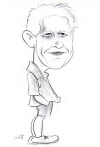

Event Enhanced Quantum Physics (EEQT)
Links to my other online papers dealing with hyperdimensional physics

Kafka on Sirens and Odysseus

Franz Kafka, "Nachgelassene Schriften und Fragmente", [Ch. 4 - p. 113], S. Fischer, Frankfurt a.M. 1992,
Der wahre Weg geht über ein Seil, das nicht in der Höhe gespannt ist, sondern knapp über dem Boden. Es scheint mehr bestimmt stolpern zu machen, als begangen zu werden.
The true way is along a rope that is not crossed high in the air, but only just above the ground. It seems intended more to cause stumbling rather than to be walked upon.
Alle menschlichen Fehler sind Ungeduld, ein vorzeitiges Abbrechen des Methodishen, ein scheinbares Einpfählen der scheinbaren Sache.
Es gibt zwei menschliche Hauptsünden aus welchem sich alle andern ableiten, Ungeduld und Lässigkeit. Wegen der Ungeduld sind sie aus dem Paradiese ausgewiesen worden, wegen der Lässigkeit kehren sie nicht zurück. Vielleicht aber gibt es nur eine Hauptsünde: die Ungeduld. Wegen der Ungeduld sind sie ausgewiesen worden und wegen der Ungeduld kehren sie nich zurück.
Von einem gewissen Punkt gibt es keine Rückkehr mehr. Dieser Punkt ist zu erreichen.
There is a point of no return. This point has to be reached.
There is no need for you to leave the house. Stay at your table and listen. Don't even listen, just wait. Don't even wait, be completely silent and alone. The world will offer itself to you to be unmasked; it can't be otherwise; in raptures it will writhe before you.
...
From "On the Treshold of a New Kabbalah. Kafka's Later Tales", by Walter A. Strauss, American University Studies, Peter Lang, New York 1988 :
Only one of the parables presents a hero who is truly safe from the
world and fortified against its wiles: not a biblical figure, but a classical
hero: Odysseus. Here Kafka offers us the closest approach to the ideal
of individual comportment in the world. It is entitled "The Silence of
the Sirens" and was written in October 1917. It begins with a paradoxical
statement: "proof that inadequate, even childish measures may preserve
one from peril." Then he recounts the details of the wax and Odysseus'
decision to have himself lashed to the mast, adding slyly that there is
no reason why other voyagers might not have done the same, "but it was
known to all the world that such things were of no help whatsoever," because
the song of the Sirens was so persuasive that those tempted by it "would
have burst far stronger bonds than chains and masts." But Odysseus was,
in Kafka's view, not really tempted: he was too childlike, too confident
in his simple devices: "But Odysseus did not think of that, although he
had probably heard of it. He trusted absolutely to his handful of wax
and his fathom of chain, and in innocent elation over his little strategem
sailed out to meet the Sirens.
At this point the parable seems to shift direction: "Now the Sirens have
a still more fatal weapon than their song, namely their silence. And though
admittedly such a thing never happened, it is still conceivable that someone
might possibly have escaped from their singing; but from their silence
certainly never. Against the feeling of having triumphed over everything
before it, no earthly powers can resist." And indeed, the Sirens maintained
silence, either because they thought that Odysseus could be vanquished
only in this manner, or because at the sight of his trustful bliss they
forgot to sing. He, on the other hand, was under the impression that they
were singing all the time and equally convinced that he was immune to
their blandishments - so much so, as a amatter of fact, that the Sirens
seemed to vanish into thin air.
Thus Odysseus, if one may so express it, did not hear their silence;
he thought they were singing and that he alone did not hear them. For
a fleeting moment he saw their throats rising and falling, their breasts
lifting, their eyes filled with tears, their lips half-parted, but believed
that these were accompaniments to the air which died unheard around him.
Soon, however, all this faded from his sight as he fixed his gaze on the
distance, the Sirens literally vanished before his resolution, and at
the very moment when they were nearest to him he knew of them no longer.
But they - lovelier than ever - stretched their necks and turned, letting
their awesome hair flutter unbound in the wind, and freely stretched their
claws on the rocks. They no longer had any desire to allure; all that
they wanted was to hold as long as they could the radiance that fell from
Odysseus' great eyes.
Last modified on: June 27, 2005.
.